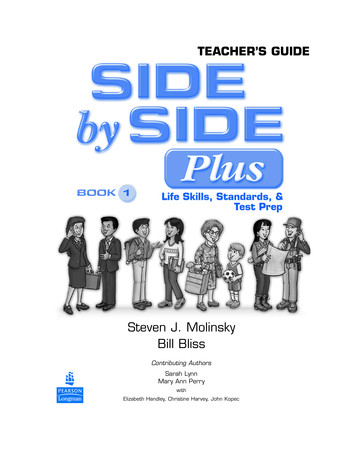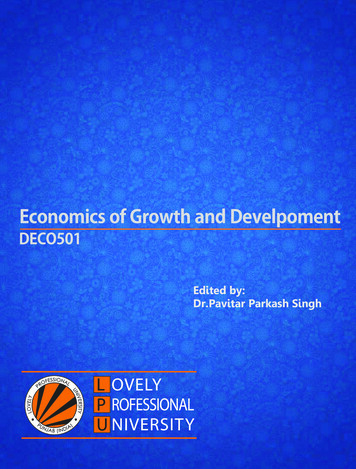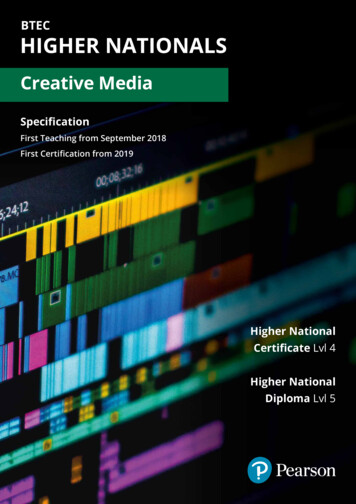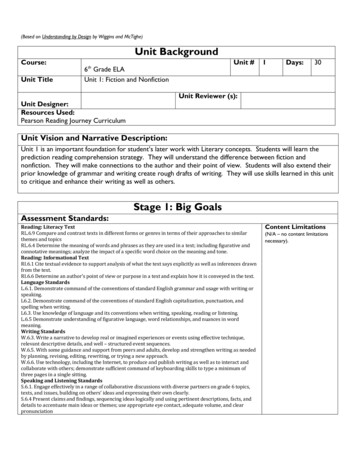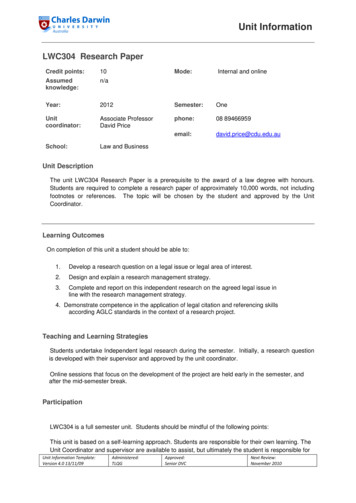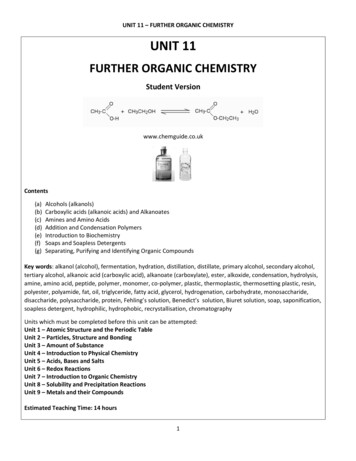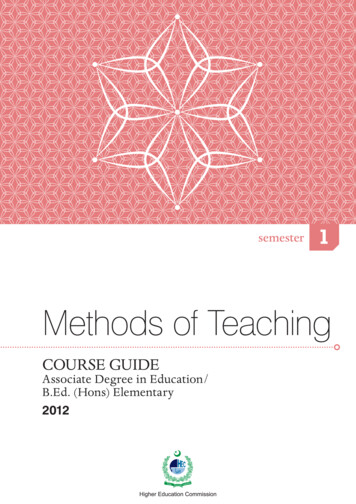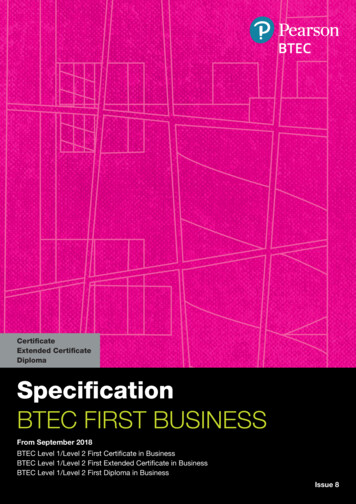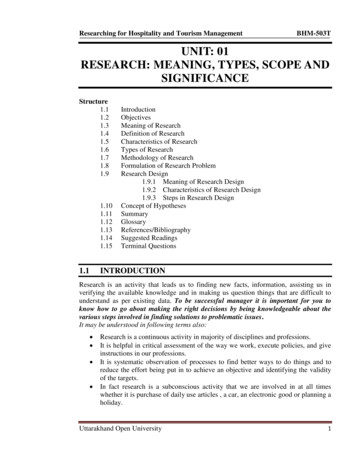
Transcription
Researching for Hospitality and Tourism ManagementBHM-503TUNIT: 01RESEARCH: MEANING, TYPES, SCOPE Meaning of ResearchDefinition of ResearchCharacteristics of ResearchTypes of ResearchMethodology of ResearchFormulation of Research ProblemResearch Design1.9.1 Meaning of Research Design1.9.2 Characteristics of Research Design1.9.3 Steps in Research DesignConcept of ggested ReadingsTerminal QuestionsINTRODUCTIONResearch is an activity that leads us to finding new facts, information, assisting us inverifying the available knowledge and in making us question things that are difficult tounderstand as per existing data. To be successful manager it is important for you toknow how to go about making the right decisions by being knowledgeable about thevarious steps involved in finding solutions to problematic issues.It may be understood in following terms also: Research is a continuous activity in majority of disciplines and professions.It is helpful in critical assessment of the way we work, execute policies, and giveinstructions in our professions.It is systematic observation of processes to find better ways to do things and toreduce the effort being put in to achieve an objective and identifying the validityof the targets.In fact research is a subconscious activity that we are involved in at all timeswhether it is purchase of daily use articles , a car, an electronic good or planning aholiday.Uttarakhand Open University1
Researching for Hospitality and Tourism Management1.2BHM-503TOBJECTIVESAfter studying this unit, you should be able to: 1.3Understand the meaning of research.Distinguish between different kinds of researches.Understand the importance, need and significance of the research.Understand research design and the process of research design.Formulate a research problem and state it as a hypothesis.MEANING OF RESEARCHResearch is a process to discover new knowledge to find answers to a question. The wordresearch has two parts re (again) and search (find) which denote that we are taking up anactivity to look into an aspect once again or we want to look for some new informationabout something. E.g Front Office Executive has to learn about the facilities, timings, keyfeatures of products and services available at the hotel if one wants to become awonderful sales professional other than being a host. "All progress is born of inquiry.Doubt is often better than overconfidence, for it leads to inquiry, and inquiry leads toinvention" is a famous Hudson Maxim in context of which the significance of researchcan well be understood.Clifford Woody states that research comprises defining and redefining problems,formulation of hypothesis; collection, organizing and evaluation of data; and reachingconclusions. Here it is emphasized that all research has to be systematic and logical toarrive at expected outcome. D. Slesinger and M. Stephenson in the Encyclopedia ofSocial Sciences Research define research as "The manipulation of things, concepts orsymbols for the purpose of generalizing to extend, correct or verify knowledge, whetherthat knowledge aids in construction of theory or in the practice of an art." The authorshave a different view of research as they suggest that it can be taken up by modifying,challenging and changing; available knowledge either to prove a process beingappropriate or to develop it in entirety.E.g. A standard recipe to prepare a particular dish may be modified by an enterprisingchef to introduce the dish in new taste, flavor or aroma by using a different method ofcooking, or by twisting the combination of spices used in the original recipe, . At thesame time the chef may create entirely new dish with the use of same ingredients. As peranother school of thought research has to undertaken under defined parameters and itshould satisfy the following conditions if you want to term the process as researchactivity. This ascertains adherence to three criteria that research:i.is undertaken by making a framework within certain philosophies;Philosophy here means approach e.g. qualitative, quantitative and the academicdiscipline in which you have been trained. Assessing and finalizing the team sizeof a preopening hotel is quantitative but developing the pre-requisites, jobspecification and job descriptions to hire trained professionals may be termed asqualitative. Also, simply specifying number of participants and time constraints inUttarakhand Open University2
Researching for Hospitality and Tourism ManagementBHM-503Ta cross country race is quantitative but defining winning criteria like fairness,completion of race, assisting a fellow participant in trouble, following the rulesand regulations, not taking assistance on the way are qualitative aspects.ii.Makes use of procedures, methods and techniques that have been tested fortheir validity and reliability;Validity means that correct procedures have been applied to find answers to aquestion. If a large plot of land has to be measured the results should be samewhether we use a meter scale or a measuring tape once we put the valuesobtained; in the formula being used to calculate the area.Reliability refers to the quality of a measurement procedure that providesrepeatability and accuracy. This is understood by the example of preparing the billof purchase using a software which has inbuilt details of taxes and charges levied,the formulas to be used and a format in which it would be printed. This ensuresthat all the bills shall have values calculated as per standard set.iii.Has been planned to be unbiased and objectiveUnbiased and objective means that you have taken each step in an unbiasedmanner and drawn each conclusion to the best of your ability and withoutintroducing your own vested interest. (Bias is a deliberate attempt to eitherconceal or highlight something). The researcher does not change / attempt tochange the procedure as per his/ her understanding of facts and information.However, the degree to which these criteria are expected to be fulfilled varies fromdiscipline to discipline and so the meaning of ‗research‘ differs from one academicdiscipline to another.1.4DEFINITIONS OF RESEARCHResearch has been interpreted and defined by various scholars as per their fields of studyand availability of resources at the given time. You will find out that the basic meaningand the context of these definitions are same. The difference between these definitionslies only in the way the author has undertaken research in his discipline.According to (Thyer, 2001), "the word research is composed of two syllables, re andsearch. re is a prefix meaning again, anew or over again search is a verb meaning toexamine closely and carefully, to test and try, or to probe. Together they form a noundescribing a careful, systematic, patient study and investigation in some field ofknowledge, undertaken to establish facts or principles." [1]As per the Merriam-Webster Online Dictionary, the word research is derived from theMiddle French ―recherche‖, which means ―to go about seeking‖, the term itself beingderived from the Old French term ―recerchier‖ a compound word from ―re-‖ ―cerchier‖,or ―searcher‖, meaning ‗search‘. The earliest recorded use of the term was in 1577.Research is a structured enquiry that utilizes acceptable scientific methodology to solveproblems and create new knowledge that is generally applicable. (Dawson, Catherine)Uttarakhand Open University3
Researching for Hospitality and Tourism ManagementBHM-503TAccording to (Rocco, 2011), "Research is a careful investigation or inquiry especiallythrough search for new facts in any branch of knowledge." Research is a movement, amovement from the known to the unknown (Redman and Mory, 2010). Research ismanipulation of things, concepts or symbols for the purpose of generalizing to extend,correct or verify knowledge, whether that knowledge aids in construction of theory or inthe practice of an art (Kothari, C.R.) .According to (Creswell, 2008), "Research issystematic investigation to establish the facts." In the broadest sense of the word, thedefinition of research includes any gathering of data, information and facts for theadvancement of knowledge. According to Clifford woody, "research comprises definingand redefining problems, formulating hypothesis or suggested solutions collecting,organizing and evaluating data, making deductions and reaching conclusions; todetermine whether they fit the formulating hypothesis." According to Cambridgedictionary online, research is "a detailed study of a subject, especially in order to discover(new) information or reach a (new) understanding." According to Kara, H (2012)."Research is an art of scientific investigation." Cohen, N. & Arieli, T. (2011), explainthat research means "gathering and analyzing a body of information or data and extractingnew meaning from it or developing unique solutions to problems or cases. This is "real"research and requires an open-ended question for which there is no ready answer.Kumar, Ranjit, (2005). said that "research is ―a careful investigation or enquiryespecially through search for new facts in any branch of knowledge." A broad definitionof research is given by Martyn Shuttleworth – ―In the broadest sense of the word, thedefinition of research includes any gathering of data, information and facts for theadvancement of knowledge.‖Another definition of research is given by Creswell whostates that – ―Research is a process of steps used to collect and analyze information toincrease our understanding of a topic or issue‖. It consists of three steps: Pose a question,collect data to answer the question, and present an answer to the question.Research may have certain other qualities such as:a) It is a prearranged / structured enquiry (a formal step by step method or sequence totake up research activity is developed to ensure correctness of data and validity ofprocesses). Scientific methods consist of systematic observation, classification andinterpretation of data. The degree of formality, rigorousness, verifiability and generalvalidity of scientific methods establish the results obtained.b) It utilizes acceptable scientific methodology to solve problems (the method usedshould be able to give repetitive results under similar conditions)c) It should create new knowledge that is generally applicable. (The outcomes should besuch that they are not specific to particular issue or a situation but need to begeneralized for application to comparable issues).d) It is creative process to develop better understanding of mankind, social and culturaland economical issues.e) It should be useful to others who wish to apply the findings in developing newpolicies or applications of findings of a research in the benefit of public.How to ensure a good quality Research?1. Purpose should be clearly defined.2. Common concepts should be used that can be understood by all.Uttarakhand Open University4
Researching for Hospitality and Tourism ManagementBHM-503T3. Research procedures should be explained in detail.4. Research design should be carefully planned.5. Researcher should declare all the possible errors and their possible impact onfindings.6. Analysis of data should be sufficiently adequate to reveal significance.7. The methods of analysis should be appropriate.8. The validity and reliability of the data should be checked carefully.9. The researcher should good command over research methodologies andshould be intelligent and experienced.10. Ethics in research refers to a code of conduct of behavior while conductingresearch. Ethical conduct applies to the organization and the members thatsponsor the research, the researchers who undertake the research, and therespondents who provide them with the necessary data.CHECK YOUR PROGRESS-I1. Define research?2. How you will ensure the quality in research?Uttarakhand Open University5
Researching for Hospitality and Tourism Management1.5BHM-503TCHARACTERISTICS OF RESEARCH:Characteristics of research determine whether a research is free of biases, prejudices, andsubjective errors or not. The terms are very commonly used in research and the successof any research depends on these terms. They can be summarised as:1. Generalized.2. Controlled.3. Rigorous.4. Empirical.5. Systematic6. Reliability.7. Validity.8. Employs hypothesis9. Analytical & Accuracy.10. Credibility.11. Critical1. Generalised: The researcher usually divides the identified population into smallersamples depending on the resource availability at the time of research beingconducted. This sample is understood to be the appropriate representative of theidentified population therefore the findings should also be applicable to andrepresentative of the entire population. The analytical information obtained fromstudying these samples should be give a fair idea of total population of being followerof particular ideology, beliefs, social stigmas, driving force, etc.E.g. A study to understand the occupancy statistics and patterns of small hotels andresorts in a given city would involve the researcher studying selected properties afterthe city is divided into zones (East, West, North, South and Central). He may alsodivide the properties on the basis of number of rooms for categorisation and selectionfor study purposes thus ensuring that the findings are representative of entire city.2.Controlled: The concept of control implies that, in exploring causality in relationto two variables (factors), you set up your study in a way that minimizes the effects ofother factors affecting the relationship. Some variables are classified as controlling factorsand the other variables may be classified as possible effects of controlling factors.Laboratory experiments as in pure sciences like chemistry can be controlled but any studythat involves societal issues cannot be controlled. E.g. Destination studies are notcontrollable as they have variables like geography, climate, accessibility, seasonality, etcbut studying the effects of standard operating procedures in a hotel applied in a particularservice can be controlled.3.Rigorous: One must be careful in ensuring that the procedures followed to findanswers to questions are relevant, appropriate and justified. Again, the degree of rigorvaries markedly between the physical and social sciences and within the social sciences.4.Empirical: The processes adopted should be tested for the accuracy and each stepshould be coherent in progression. This means that any conclusions drawn are based uponUttarakhand Open University6
Researching for Hospitality and Tourism ManagementBHM-503Tfirm data gathered from information collected from real life experiences or observations.Empirical nature of research means that the research has been conducted followingrigorous scientific methods and procedures. Quantitative research is easier to provescientifically than qualitative research. In qualitative research biases and prejudice areeasy to occur.5.Systematic: The procedure or process being developed to undertake a studyshould be carefully drafted to ensure that resources utilization is optimized. Chaotic ordisorganized procedures would never yield expected outcomes. The steps should followa logical sequence to get to the desired outcome. E.g The meal in a fine dine restaurant ata five star hotel cannot commence with dessert being served before the starter or soupcourse.6.Reliability: This is a the degree to which the result of a measurement, calculation,or specification can be depended on to be accurate.It is difficult to be measuredaccurately, but now there are instruments which can estimate the reliability of a research.It is the extent to which an experiment, test, measuring procedure, research, researchinstrument, tool or procedure yields the same results on repeated trials. If any researchyields similar results each time it is undertaken with similar population and with similarprocedures, it is called to be a reliable research.7.Validity & Verifiability: It is the extent to which a concept, conclusion ormeasurement is well-founded and likely corresponds accurately to the real world. Theword "valid" is derived from the Latin validus, meaning strong. This should not beconfused with notions of certainty nor necessity. The validity of a measurement tool (forexample, a test in education) is considered to be the degree to which the tool measureswhat it claims to measure. Validity is based on the strength of a collection of differenttypes of evidence. In terms of research validity is the strength with which we can makeresearch conclusions, assumptions or propositions true or false. Validation refers toaccuracy of measurement whether or not it measures what it is supposed to measure. Italso ascertains the application of research in finding the solution to an issue in differentconditions. This gives a clear direction to the research activity. The findings of a studyshould be verifiable by the researcher as well as anyone else who wants to conduct thestudy on similar guidelines/ under similar conditions.8.Employs Hypothesis: Any research definitely begins with formulation of ahypothesis. It is a supposition or proposed explanation made on the basis of limitedevidence as a starting point for further investigation. A hypothesis can be defined as aneducated guess about the relationship between two or more variables. In simple words ahypothesis is an idea around which one starts working before it is actually converted toresearch. A question is what forms the base and is later termed as hypothesis and it mayor may not draw a logical outcome. Hypothesis may prove to be wrong or null or voidafter the study is conducted.A hypothesis is an informed and educated prediction or explanation about something. Partof the research process involves testing the hypothesis, and then examining the results ofthese tests as they relate to both the hypothesis and the world around you. When aUttarakhand Open University7
Researching for Hospitality and Tourism ManagementBHM-503Tresearcher forms a hypothesis, this acts like a map through the research study. It tells theresearcher which factors are important to study and how they might be related to eachother or caused by a manipulation that the researcher introduces (e.g. a program,treatment or change in the environment). With this map, the researcher can interpret theinformation he/she collects and can make sound conclusions about the results.9.Analytical & Accurate : A research should be focussed not only about what ishappening but also on how and why a particular phenomenon, process draws certainconclusions. Any data collected if does not yield results or is unsuitable to be used forfurther studies or applications disrupts the purpose of research. Therefore, data collectedshould be reasonable and free of errors to be easily analysed.Accuracy is also the degree to which each research process, instrument, and tool isrelated to each other. Accuracy also measures whether research tools have been selectedin best possible manner and research procedures suits the research problem or not.Selection of appropriate data collection tools is essential for a research.E.g. Guest Comments Card in hotels or Feedback Collection Card in a dining outlet givesthe guest a chance to be honest in commenting about the standard of services incomparison to asking them to give a verbal feedback.10.Credibility: The extent to which an analysis of finding can be treated to betrustworthy is tremed as credibility. This can only be assured by the use of the best sourceof information and best procedures in research. Researches based on secondary data arenot reliable as such data may have been manipulated or distorted by earlier researchers tosuit their work. The availability of secondary data from public domains is easy but cokeswith lots of risks involved. The research study conducted based on primary data is alwaysreliable and carries more credibility. A certain percentage of secondary data can be usedif the primary source is not available but basing a research completely on secondary datawhen primary data can be gathered is least credible. When researcher gives accuratereferences in the research the credibility of the research increases but fake references alsodecrease the credibility of the research.11.Critical: Critical scrutiny of the procedures used and the methods employed iscrucial to a research enquiry. The process of investigation must be foolproof and freefrom drawbacks. The process adopted and the procedures used must be able to withstandcritical scrutiny.1.6TYPES OF RESEARCHResearch can be classified into various categories depending on the perspective underwhich the research activity is initiated and conducted. The categorization depends on thefollowing perspectives in general: Application of research studyObjectives in undertaking the researchUttarakhand Open University8
Researching for Hospitality and Tourism Management BHM-503TInquiry mode employed for research1. Classification based on Application:a. Pure / Basic / Fundamental Research: As the term suggests a researchactivity taken up to look into some aspects of a problem or an issue for thefirst time is termed as basic or pure. It involves developing and testingtheories and hypotheses that are intellectually challenging to the researcherbut may or may not have practical application at the present time or in thefuture. The knowledge produced through pure research is sought in order toadd to the existing body of research methods. Pure research is theoretical buthas a universal nature. It is more focused on creating scientific knowledge andpredictions for further studies.b. Applied / Decisional Research: Applied research is done on the basis of pureor fundamental research to solve specific, practical questions; for policyformulation, administration and understanding of a phenomenon. It can beexploratory, but is usually descriptive. The purpose of doing such research isto find solutions to an immediate issue, solving a particular problem,developing new technology and look into future advancements etc. Thisinvolves forecasting and assumes that the variables shall not change.Key Differences between Basic and Applied Researcha) Basic Research can be explained as research that tries to expand the alreadyexisting scientific knowledge base. On the contrary, applied research is usedto mean the scientific study that is helpful in solving real-life problems.b) While basic research is purely theoretical, applied research has a practicalapproach.c) The applicability of basic research is greater than the applied research, in thesense that the former is universally applicable whereas the latter can beapplied only to the specific problem, for which it was carried out.d) The primary concern of the basic research is to develop scientific knowledgeand predictions. On the other hand, applied research stresses on thedevelopment of technology and technique with the help of basic science.e) The fundamental goal of the basic research is to add some knowledge to thealready existing one. Conversely, applied research is directed towards findinga solution to the problem under consideration.2. Classification based on Objectives:a. Descriptive Research: This attempts to explain a situation, problem,phenomenon, service or programme, or provides information viz. livingcondition of a community, or describes attitudes towards an issue but this isdone systematically. It is used to answer questions of who, what, when,where, and how associated with a particular research question or problem.This type of research makes an attempt to collect any information that can beUttarakhand Open University9
Researching for Hospitality and Tourism ManagementBHM-503Texpressed in quantifiable terms that can be used to statistically analyze atarget audience or a particular subject. Descriptive research is used to observeand describe a research subject or problem without influencing ormanipulating the variables in any way. Thus, such studies are usuallycorrelation or observational. This type of research is conclusive in nature,rather than inquisitive. E.g. explaining details of budget allocation changes todepartmental heads in a meeting to assure clarity and understanding forreasons to bring in a change.b. Co relational Research: This is a type of non-experimental research method,in which a researcher measures two variables, understands and assesses thestatistical relationship between them with no influence from any extraneousvariable. This is undertaken to discover or establish the existence of arelationship/ interdependence between two or more aspects of a situation. Forexample, the mind can memorize the bell of an ice cream seller or sugarcandy vendor. Louder the bell sound, closer is the vendor to us. We draw thisinference based on our memory and the taste of these delicious food items.This is specifically what co relational research is, establishing a relationshipbetween two variables, ―bell sound‖ and ―distance of the vendor‖ in thisparticular example. Co relational research is looking for variables that seem tointeract with each other so that when you see one variable changing, you havea fair idea how the other variable will change.c. Explanatory: is the research whose primary purpose is to explain whyevents occur, to build, elaborate, extend or test a theory. It is more concernedwith showcasing, explaining and presenting what we already have. It is theprocess of turning over 100 rocks to find perhaps 1 or 2 precious gemstones.Explanatory survey research may look into the factors that contribute tocustomer satisfaction and determine the relative weight of each factor, or seekto model the variables that lead to people shifting to departmental stores fromsmall shops from where they have been making purchases till now. Anexploratory survey posted to a social networking site may uncover the factthat an organization‘s customers are unhappy thus helping the organizationtake up necessary corrective measures.d. Exploratory Research: Exploration has been the human kind‘s passion sincethe time immemorial. Looking out for new things, new destinations, newfood, and new cultures has been the basis of most tourist and travel journeys.In the subjective terms exploratory research is conducted to find a solution fora problem that has not been studied more clearly, intended to ndimprovethefinal research design. Exploratory research helps determine the bestresearch design, data-collection method and selection of subjects. For such aresearch, a researcher starts with a general idea and uses this research as amedium to identify issues that can be the hub for future research. Animportant aspect here is that the researcher should be willing to change his/herdirection subject to the revelation of new data or insight. Such a research isUttarakhand Open University10
Researching for Hospitality and Tourism ManagementBHM-503Tusually carried out when the problem is at a beginning stage. It is oftenreferred to as grounded theory approach or interpretive research as it used toanswer questions like what, why and how. For example: a fast food outletowner feels that increasing the variety of snacks will enable increase in sales,however he is not sure and needs more information. Thus the owner startsstudying local competition, talks to the existing customers, friends etc to findout what are their views about the current menu and what else do they wish tobe included in the menu and also assess whether he would be able to generatehigher revenues.3. Classification based on Inquiry Mode:a. Structured approach: The structured approach to inquiry is usuallyclassified as quantitative research. Here everything that forms the researchprocess- objectives, design, sample, and the questions that you plan to ask ofrespondents- is predetermined. It is more appropriate to determine the extentof a problem, issue or phenomenon by quantifying the variation e.g. howmany people have a particular problem? How many people hold a particularattitude? E.g. asking a guest to give feedback about the dishes served in arestaurant.b. Unstructured approach: The unstructured approach to inquiry is usuallyclassified as qualitative research. This approach allows flexibility in allaspects of the research process. It is more appropriate to explore the nature ofa problem, issue or phenomenon without quantifying it. Main objective is todescribe the variation in a phenomenon, situation or attitude e.g., descriptionof an observed situation, the historical enumeration of events, an account ofdifferent opinions different people have about an issue, description ofworking condition in a particular industry. E.g. when guest is complainingabout the room not being comfortable and is demanding a discount the staffhas to verify the claims empathically.In many studies you have to combine both qualitative and quantitativeapproaches. For example, suppose you have to find the types of cuisine /accommodation available in a city and the extent of their popularity. Types ofcuisine are the qualitative aspect of the study as finding out about them entailsdescription of the culture and cuisine. The extent of their popularity is thequantitative aspect as it involves estimating the number of people who visitrestaurant serving such cuisine and calculating the other indicators that reflectthe extent of popularity.4. Other Types of Research:(i)Descriptive v/s Analytical: Descriptive research includes surveys and factfinding enquiries of different kinds. The major purpose of descriptive research isdescription of the state of affairs as it exists at any given time. The term Ex postfacto research is used in social sciences and business
Understand research design and the process of research design. Formulate a research problem and state it as a hypothesis. 1.3 MEANING OF RESEARCH Research is a process to discover new knowledge to find answers to a question. The word research has two parts re (again) and search (find) which denote that we are taking up an
